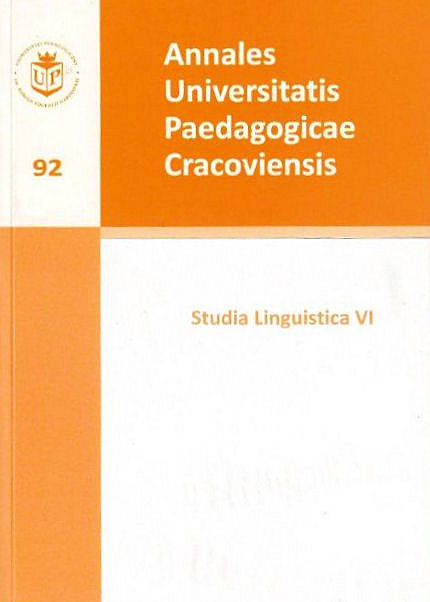Boskie a diabelskie – na podstawie polskich przysłów i frazeologizmów
Main Article Content
Abstract
The paper analyzes proverbs and idiomatic expressions that present relations between God and the Devil. It is commonly believed that the forces of good (God) and of evil (the Devil) are clearly separated (the formula: GOD AND the DEVIL). God creates and symbolizes all that is good, while the Devil perpetrates and stands for evil. Man has to choose (the formula: GOD OR the DEVIL). Although the choice seems obvious (the formula: GOD ABOVE the DEVIL), man chooses wrong (the formulas: BOTH GOD AND the DEVIL; the DEVIL INSTEAD OF GOD) or makes no choice at all (the formula: NEITHER GOD NOR the DEVIL). The clear order of things (the divine and the devilish apart) may also be destroyed when man gives vent to his feelings. In expressive idiomatic expressions the words God and Devil are interchangeable.
Downloads
Article Details
Author, submitting a text to the editorial board of the journal “Annales Universitatis Paedagogicae Cracoviensis. Studia Linguistica", certifies that the content of the article has not been published so far and that the work does not violate in any way the copyright or related rights of other person, as well as other rights of third parties, and that no one's rights to the work (or any part thereof) have been missed. After signing the contract, the property rights to the published materials are transferred to the University of the National Education Commission, Krakow.
“Annales Universitatis Paedagogicae Cracoviensis. Studia Linguistica” is an open access journal, and all its content is made available free of charge to users and institutions under the Creative Commons CC-BY-NC-ND 4.0 license (attribution, non-commercial use, no derivative works). Under this license, the authors agree that their work may be lawfully reused for any purpose, except for commercial purposes, without the prior consent of the author or publisher. Everyone can read, download, copy, print, distribute and process these works, provided that the author's marking and the original publication place are correct. Published texts may not be used to create derivative works (e.g. to translate and publish in another language without the consent of the publisher). This is in line with the BOAI (Budapest Open Access Initiative) definition. "Studia Linguistica" does not charge for submitting or processing articles.
References
Długosz K., 2007, Językowy obraz diabła w przysłowiach, „Prace Filologiczne”, t. 53, s. 153–158.
Google Scholar
Frazeologia a religia. Tezy referatów międzynarodowego sympozjum naukowego Opole, 4–6 września 1996 r., 1996, red. W. Chlebda, S. Kochman, Opole.
Google Scholar
Iwczenko J., 2005, Funkcje oraz predykaty diabła we frazeologii polskiej i ukraińskiej. Rekonstrukcja wyobrażeń ludowych, [w:] Folklor w badaniach współczesnych, red. A. Mianecki, A. Osińska, L. Podziewska, Toruń, s. 211–217.
Google Scholar
Івченко Ярослава А., 2007, Образ чорта у польській фразеологічній та пареміологічній картині світу, [w:] Frazeologia a językowe obrazy świata przełomu wieków, red. W. Chlebda, Opole, s. 213–218.
Google Scholar
Różańska K. (� Szostak), 2007, Językowo-kulturowy obraz Boga we frazeologii i paremiologii języka polskiego i rosyjskiego (II), „Rozprawy Komisji Językowej Wrocławskiego Towarzystwa Naukowego”, t. 34, s. 73–98.
Google Scholar
Różańska K. (� Szostak), 2008, Konfrontacja polsko-rosyjska na przykładzie wybranych frazeologizmów i przysłów odnoszących się do Boga, [w:] Wyraz i zdanie w językach słowiańskich 6. Opis, konfrontacja, przekład, red. M. Sarnowski, W. Wysoczański, Wrocław, s. 377–391.
Google Scholar
Skorupska-Raczyńska E., 2008, Językowy obraz diabła w polszczyźnie ogólnej, [w:] Szatan w religii i kulturze, red. ks. S. Bukalski, Szczecin, s. 187–200.
Google Scholar
Szostak K., 2006, Językowo-kulturowy obraz Boga we frazeologii i paremiologii języka polskiego i rosyjskiego (I), „Rozprawy Komisji Językowej Wrocławskiego Towarzystwa Naukowego", t.32, s.113 - 132.
Google Scholar
